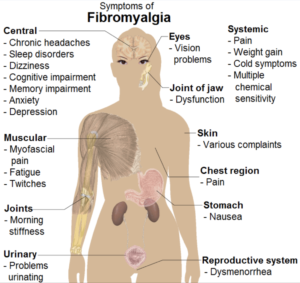The Keto Diet for Fibromyalgia
Understanding Fibromyalgia
Fibromyalgia (FM) is a chronic condition that causes widespread musculoskeletal pain, fatigue, and psychological distress. Those affected often experience sleep disturbances, memory issues, and mood swings. These symptoms can significantly disrupt daily life, making even simple tasks challenging.
Traditional FM treatments focus on managing these symptoms through medications, physical therapy, and lifestyle changes. However, these methods often fall short in addressing the root causes of FM, leaving many patients searching for more effective solutions.

Prevalence of Fibromyalgia
Fibromyalgia affects a significant portion of the population. In Canada, approximately 2% of people are diagnosed with FM, with 80 to 90% of these patients being women.
In the United States, the prevalence of fibromyalgia is even higher. A study from June 2023 found that about 6.4% of the U.S. population suffers from FM, with a notably higher rate in women (7.7%) compared to men. These statistics underscore the widespread and significant burden of FM, emphasizing the need for more effective treatment options.
By addressing underlying metabolic dysfunctions and reducing inflammation, the keto diet offers new hope for those struggling with the debilitating symptoms of fibromyalgia.
Approximately 7.7% of U.S. women have been diagnosed with fibromyalgia.
What is a Ketogenic Diet?
The ketogenic diet, often called the keto diet, is a low-carbohydrate, high-fat diet with adequate protein intake. By drastically reducing carbs, the body shifts its metabolism towards using ketone bodies for energy instead of glucose.
This metabolic state, known as ketosis, has shown promise in managing various chronic conditions, including fibromyalgia.

How Can Ketosis Help Fibromyalgia?
The keto diet for fibromyalgia works by changing the body’s energy source from glucose to ketone bodies. This shift can lead to several benefits:
- Reduced Inflammation: The ketogenic diet can lower inflammation levels, which is crucial for managing FM symptoms. Chronic inflammation is often linked to increased pain and fatigue in FM patients.
- Improved Energy Levels: By using ketones for energy, the body may experience more stable and efficient energy production. This can help reduce the fatigue that many FM patients suffer from daily.
- Enhanced Mental Clarity: Many people on a ketogenic diet report improved mental clarity and cognitive function. This can be particularly beneficial for FM patients who often struggle with “fibro fog.”
The ketogenic diet helps manage fibromyalgia by reducing inflammation, stabilizing energy levels, and enhancing mental clarity.
Study Overview
The study titled “Investigating the Effectiveness of a Carb-Free Oloproteic Diet in Fibromyalgia Treatment” aimed to explore the benefits of a ketogenic diet for fibromyalgia. It included two groups of female FM patients who followed different dietary interventions over a 45-day period.
One group followed the oloproteic diet, a very-low-calorie ketogenic diet (VLCKD) tailored to their body mass index (BMI). The other group followed a low-glycemic insulinemic (LOGI) diet, which included moderate consumption of low-glycemic-index carbohydrates and normal protein levels.
Methodology
The study lasted for 45 days and focused on several key metrics to assess the effectiveness of the dietary interventions. Researchers used the Widespread Pain Index (WPI) and Symptom Severity Scale (SSS) to measure changes in fibromyalgia symptoms. They also conducted NMR metabolomic analysis of blood serum, urine, and saliva to observe metabolic changes.
Participants in the oloproteic diet group consumed minimal carbohydrates with adjusted protein and lipid content based on their BMI. This specific dietary regimen aimed to shift their metabolism towards using ketone bodies for energy.
The LOGI diet group, in contrast, consumed a moderate amount of low-glycemic-index carbohydrates along with normal protein levels.
The study’s comprehensive approach allowed researchers to evaluate not only the physical symptom changes but also the metabolic impacts of the dietary interventions. The focus on these detailed metrics helped highlight the potential benefits of the keto diet for fibromyalgia, offering new insights into how diet can play a crucial role in managing this chronic condition.
The study’s comprehensive approach allowed researchers to evaluate not only the physical symptom changes but also the metabolic impacts of the dietary interventions.
Key Findings and Benefits of the Keto Diet for Fibromyalgia
The study revealed that the ketogenic diet for fibromyalgia led to significant improvements in symptoms. Patients following the oloproteic diet experienced a notable reduction in their Widespread Pain Index (WPI) and Symptom Severity Scale (SSS) scores. Specifically, the SSS index decreased by 42.7% in the oloproteic diet group, compared to a 25.33% reduction in the LOGI diet group.
This significant improvement highlights the greater effectiveness of the ketogenic diet in alleviating fibromyalgia symptoms. The study emphasized that “the SSS index at t45 decreased by 42.7% in FM1 and 25.33% in FM2,” showcasing the remarkable impact of the ketogenic diet on reducing symptom severity.
The SSS index decreased by 42.7% in the oloproteic diet group, compared to a 25.33% reduction in the LOGI diet group, showcasing the remarkable impact of the ketogenic diet on reducing symptom severity.
Mental Health Benefits
Beyond physical symptom relief, the ketogenic diet also showed positive effects on mental health. The study observed substantial reductions in anxiety and depression symptoms among the oloproteic diet group. One notable finding was that the average value of anxiety symptoms decreased significantly, highlighting the broader benefits of this dietary approach.
The study noted, “In FM1, the average value of anxiety symptoms decreased significantly,” underscoring the oloproteic diet’s potential to improve overall mental health. These improvements suggest that the keto diet for fibromyalgia can enhance overall well-being, addressing both physical and psychological aspects of the condition.
The study observed substantial reductions in anxiety and depression symptoms among the oloproteic diet group.
Metabolic Benefits
The ketogenic diet also brought about significant metabolic changes in fibromyalgia patients. NMR metabolomic analysis revealed a rebalancing of biochemical pathways associated with pain perception. This metabolic shift likely contributed to the observed reductions in fibromyalgia symptoms.
The study highlighted that “a rebalancing of the biochemical pathways associated with pain perception” was observed, which may contribute to the symptom improvements. Additionally, the oloproteic diet was linked to decreased inflammation and enhanced neurotransmission. The study concluded that the “oloproteic diet fostered a rebalancing of inflammatory conditions,” further supporting its therapeutic potential for FM patients.
The ketogenic diet brought about significant metabolic changes. NMR metabolomic analysis revealed a rebalancing of biochemical pathways associated with pain perception.
Systemic Impact on Metabolism
The metabolomic analysis indicated that the oloproteic diet had a more profound systemic effect compared to the LOGI diet. Significant changes were observed in metabolites that influence neurotransmission and energy availability. These changes are crucial for managing fibromyalgia symptoms, as they address underlying metabolic dysfunctions often associated with the condition.
By improving overall metabolism, the ketogenic diet offers a comprehensive approach to managing fibromyalgia. The study’s findings suggest that the oloproteic diet had a more systemic effect, impacting various metabolic pathways related to FM dysfunction.
Significant changes were observed in metabolites that influence neurotransmission and energy availability.
This study provides compelling evidence that a ketogenic diet, particularly the oloproteic diet, can significantly reduce the symptoms of fibromyalgia. The improvements in physical symptoms, mental health, and metabolic functions highlight the potential of this dietary approach as a valuable strategy for managing fibromyalgia.
As the study aptly summarizes, “The oloproteic diet protocol could serve as an effective treatment for the significant reduction of FM symptoms,” highlighting its potential as a transformative dietary intervention for fibromyalgia patients.
The study concluded: “The oloproteic diet protocol could serve as an effective treatment for the significant reduction of FM symptoms.”
Adopting a Keto Diet for Fibromyalgia

For those considering the ketogenic diet for fibromyalgia, practical steps can help ease the transition and maximize benefits. Here are some key considerations:
- Personalized Dietary Plans: The oloproteic diet, as highlighted in the study, is tailored to an individual’s body mass index (BMI). Working with a nutritionist can help you create a diet plan that meets your specific needs, ensuring adequate protein and lipid intake while minimizing carbohydrates.
- Monitor Your Symptoms: Keep track of your fibromyalgia symptoms as you start the diet. Note any changes in pain levels, energy, and mental clarity. This can help you and your healthcare provider assess the diet’s effectiveness and make necessary adjustments.
- Stay Hydrated and Maintain Electrolyte Balance: The ketogenic diet can lead to increased water loss and changes in electrolyte levels. Ensure you stay hydrated and consider supplements to maintain a healthy balance of electrolytes, such as sodium, potassium, and magnesium.
- Support and Resources: Join support groups or online communities of others following a ketogenic diet for fibromyalgia. Sharing experiences and tips can provide encouragement and practical advice.
Adopting a ketogenic diet tailored to fibromyalgia can be a promising step towards better symptom management and overall well-being. This dietary change could offer significant relief for many FM patients.

Key Takeaways
- Symptom Reduction: The ketogenic diet, particularly the oloproteic diet, significantly reduces fibromyalgia symptoms, including pain and fatigue.
- Mental Health Benefits: This diet also improves mental health, reducing anxiety and depression symptoms among fibromyalgia patients.
- Metabolic Improvements: The ketogenic diet positively impacts metabolic functions, rebalancing biochemical pathways and reducing inflammation.
- Personalized Approach: Tailoring the diet to an individual’s BMI and working with healthcare providers enhances its effectiveness.
- Comprehensive Benefits: Overall, the ketogenic diet offers a holistic approach to managing fibromyalgia, addressing both physical and psychological aspects of the condition.

Final Thoughts
The ketogenic diet, especially the oloproteic version, presents a promising approach for managing fibromyalgia. By significantly reducing symptoms, improving mental health, and positively impacting metabolic functions, this dietary intervention offers a holistic alternative to traditional treatments.
The recent study in Nutrients highlights the diet’s potential to transform the lives of fibromyalgia patients by addressing both the physical and psychological aspects of the condition. This is such hopeful news!
For those struggling with the challenges of fibromyalgia, adopting a ketogenic diet could provide much-needed relief and improve overall well-being. With further research and continued exploration, the ketogenic diet could become a widely recognized strategy for effectively managing fibromyalgia.
What are your thoughts? Drop me a comment below!
References
- Investigating the Effectiveness of a Carb-Free Oloproteic Diet in Fibromyalgia Treatment. Nutrients
- Chronic fatigue syndrome and fibromyalgia in Canada… PMC
- Canadian Pain Task Force Report. Government of Canada
- Fibromyalgia. NIH
- The diagnosis of fibromyalgia syndrome. Clinical Medicine
- Fibromyalgia. Arthritis Society Canada
Keto PowerFlax Baking Mix: Keto & So Much More!

- Commercial Bakeries: you can easily produce delicious flax-based keto-friendly products which are clean label, high protein, high fiber and vegan
- Works with your current equipment and baking processes
- Recipes provided on all bulk orders, with ongoing customer support
- Worldwide shipping
- Get in touch with us today!

What to Read Next
- Keto Diet for Depression and Anxiety: Study Shows Complete Remission!
- Healing Disease Through Diet: Why Ketosis Works
- The Chronic Fatigue Syndrome Diet (Keto For CFS)
- Keto Diet for Hashimoto’s: Science-Backed Thyroid Support

